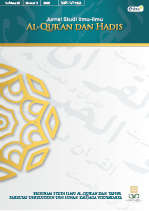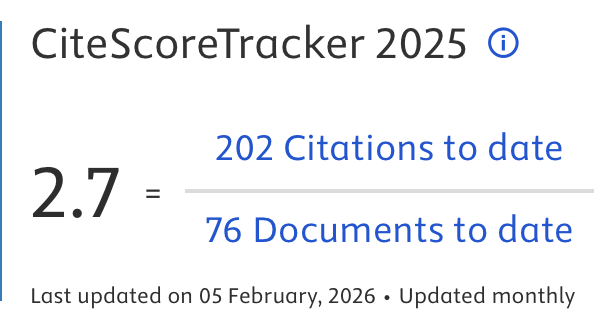Redefining Khabar Al-Ahad Based on Rashid Rida’s Rational Approach in Al-Manar
DOI:
https://doi.org/10.14421/qh.v23i2.2812Keywords:
Khabar ahad; Rashid Rida; Al-Manar, Rational ApproachAbstract
This paper discusses the Rida controversy with hadith scholars. The controversy stems from Rida’s a priori to the traditions that are popular and well-known among hadith scholars, especially the category of khabar al-ahad hadith. The root of their problem lies in Rida’s rational critique of the categories and implications of khabar al-ahad. He considers dilalah (connotation) of khabar al-ahad to be nothing more than just zanni al-dilalah (presumption and uncertainty). The implication is that hadith in this category cannot be used as a basis for belief because belief is based on qat’i al-dilalah (certainty of proposition). The research method used was descriptive-analytic method. This method was combined with a historical-philosophical approach. Therefore, analyzing and describing Rida’s thoughts as a whole is the main work in this article. The next step was to combine the analytical-philosophical approach to the roadmap from the genuine part of Rida’s line of thought. This activity is expected to help the author in finding answers on how Rida rationalizes khabar al-ahad and its implications. Finally, this article finds the conclusions, including: a) Rida’s efforts in rationalizing khabar al-ahad are based on the views of the mutakallimūn (theologians), manat}iqah (logic experts) and falasifah (philosophers), b) Rida has been trapped in his own over a priori thinking on khabar al-ahad, c) Rashid Rida’s rationalization of khabar al-ahad actually leads to ambiguity and uncertainty.
References
‘Akkashah, Ra’id Jamil. Rashid Rida: Juhuduh al-Islahiyyah wa Manhajuh al-‘Ilmi (Jordan: al-Ma’had al-‘Alami li al-Mufakkir al-Islami , 1999).
‘Ali bin Muhammad al-Amidi, al-Ihkam fi Usul al-Ahkam (Beirut: al-Maktab al-Islami, 1402).
A Controversy About The Outhority of Khabar al-Wahid With A Special Reference to al-Shafi’I’s Views (public_view.php.pdf).
Ahmad, ‘Abd al-Jabbar, Sharh al-Usul al-Khamsah, Ta’liq: Ahmad bin Husein bin Abi Hashim, Tahqiq: ‘Abd al-Karim ‘Uthman (Kairo: Maktabah Wahbah, 1996/1416).
Ahmad bin Sulayman Ayyub, Muntaha al-Amani bi Fawa’id Mustalah al-Hadith li al-Muhaddith al-Albani (Cairo: al-Faruq al-Hadi thiyyah, 2003/1423).
Al-‘Adawi, Ibrahi m Ahmad. Rashid Rida al-Imam al-Mujahid (Mesir: al-Mu’assasah al-Misriyyah al-‘Ammah, tth).
Al-‘Amiri, Yusuf Muhammad. Ka’b al-Ahbar Marwiyatuh wa Aqwaluh fi al-Tafsir bi al-Ma’thur: Jam’an wa Dirasatan (Makkah: Jami’ah Umm al-Qura, 1412/1992).
Al-‘Asqalani, Ahmad ‘Ali bin Muhammad bin Hajar. Nuzhah al-Nazar fi Tawjih Nukhbah al-Fikr fi Mustalah Ahl al-Athar (Madi nah: Jami’ah Ti bah, 2008/1429).
Al-Afghani, Jamal al-Din. al-‘A’mal al-Kamilah, Dirarah wa Tahqiq: Muhammad ‘Imarah, al-Kitabat al-Siyasiyah (Beirut: al-Mu’assasah al-‘Arabiyyah li al-Dirasat wa al-Nashr, 1981).
Al-Shafi’i>Muhammad bin Idri>s, al-Risalah (Mesir: Matba’ah Mustafa al-Babi> al-Halabi>, 1938/1357).
Al-Ashqar,‘Umar Sulayman. Usul al-I’tiqad (Kuwait: al-Dar al-Salafiyah, 1985/1405).
Al-Dimashqi, Tahir al-Jaza’iri, Tawjih al-Nazar Ila Usul al-Athar (Halab: Maktabah al-Matbu’ah al-Islamiyyah: tth).
Al-Ghazali, Abu Hamid Muhammad bin Muhammad. al-Mustasfa min ‘Ilm al-Usul, tahqi q: Hamzah Zuheir (Madi nah: al-Jami’ah al-Islamiyyah, 1413).
Al-Ghazali, Muhammad. al-Haqq al-Murr (Cairo: al-Nahdah, 1996).
Al-Jurjani, ‘Ali bin Muhammad al-Sayyid al-Sharif. Mu’jam al-Ta’rifat (Cairo: Dar al-Fadi lah, 2004).
Al-Rumi, Fahd bin ‘Abd al-Rahman bin Sulayman. Ittijahat al-Tafsir fi al-Qarn al-Rabi’ ‘Ashr, 4th ed. (Riyad: Maktabah al-Rushd, 2002).
Al-Shafi’i, Muhammad bin Idris. al-Risalah (Mesir: al-Halabi , 1938/1457).
Al-Shafi’i, Muhammad bin Idris. Jima’ al-‘Ilm (Mesir: Dar al-Kutub, 1359/1940).
Al-Sharif, Muhammad Ibrahim. Ittijahat al-Tajdid fi Tafsir al-Qur’an al-Karim (Cairo: Dar al-Salam, 2008).
Al-Shawkani, Muhammad bin ‘Ali. Irshad al-Fuhul ila Tahqiq al-Haqq min ‘Ilm al-Usul (Riyad: Dar al-Fadi lah, 2000/1421).
Al-Shayrazi, Abu Ishaq Ibrahim bin ‘Ali bin Yusuf al-Fayruz Abadi. al-Tabsirah fi Usul al-Fiqh (Damashq: Dar al-Fitr, 1983/1403).
Al-Siba’i, Mustafa. al-Sunnah wa Makanatuha fi al-Tashri’ al-Islami (Cairo: Dar al-Warraq, 1949).
Burge, Stephen R. “The Demystification of Magic in the Tafsir Al-Manar: An Analysis of the Exegetical and Homiletic Devices Used in the Discussion ‘Mabḥath Al-Siḥr Wa-Harut Wa-Marut.’” Religions 12, no. 9 (2021).
Dimashqiyyah, ‘Abd al-Rahman bin Muhammad Sa’id. Mausu’ah Ahl al-Sunnah fi Naqd Usul Firqah al-Ahbash wa man Wafaqahum fi Usulihim (Riyad: Dar al-Muslim, 1997/1418).
Eraslan, Abdulvasıf. “The Narrative Philosophy of Rational Approach in Islam Abstract (The Case of Qadi AbdAl-Jabbar).” Cumhuriyet Ilahiyat Dergisi 24, no. 3 (2020).
Kahalah, ‘Umar Rida. Mu’jam al-Mu’allifin: Tarajum Musannifi al-Kutub al-‘Arabiyyah (Beirut: Mu’assah al-Risalah, 1414/1993).
Matuli, Tamir Mahammad Mahmud, Manhaj al-Syekh Muhammad Rashid Rida fi al-‘Aqidah (Riyad: Dar Majid ‘Asiri>, 2004/1425).
Othman, Mohammad Redzuan, and Abu Hanifah Haris. “Egyptian Influences on Malaya’s Muslim Kaum Muda (Young Faction) Before World War II.” Al-Shajarah, 2013.
Ramadani, Muhammad bin Ramadan. Ara’ Muhammad Rashid Rida fi Qadaya al-Sunnah al-Nabawiyyah min Khilal Majallah al-Manar Dirasah Tahliliyyah Naqdiyyah, (Riyad: Majallah al-Bayan, 1434).
Rida, Muhammad Rashid. al-Wahy al-Muhammadi: Thubut al-Nubuwwah bi al-Qur’an wa Da’wah Shu’ub al-Madinah ila al-Islam Din al-Ukhuwah al-Insaniyyah wa al-Salam (Beirut: Mu’assasah ‘Izz al-Din, 1352).
Rida, Muhammad Rashid. Majallah al-Manar, edisi hari Kamis, 1 Rabi’ al-Awwal, juz 12, jilid 3, tahun 1318.
Rida, Muhammad Rashid. Tafsi r al-Manar (Cairo: Dar al-Manar, 1947/1366).
……….. Tafsi r al-Qur’an al-Haki m atau biasa disebut Tafsi r al-Manar (Cairo: Dar al-Manar, 1947/1366).
Womack, Deanna Ferree. “The Authenticity and Authority of Islam: Muhammad Rashid Rida’s Response to Twentieth-Century Missionary Publications.” Social Sciences and Missions, 2015.
———. “The Authenticity and Authority of Islam.” Social Sciences and Missions 28, no. 1–2 (2015).
Ya’qub, Tahir Mahmud Muhammad. Asbab al-Khata’ fi al-Tafsi r Dirasah Ta’si liyyah (Saudi: Dar Ibn al-Jauzi : 1425).
Downloads
Published
Issue
Section
License
Copyright (c) 2022 Abdul Matin Bin Salman

This work is licensed under a Creative Commons Attribution-NonCommercial-NoDerivatives 4.0 International License.
Publishing your paper with Jurnal Studi Ilmu-ilmu al-Qur'an dan Hadis means that the author or authors retain the copyright in the paper. Jurnal Studi Ilmu-ilmu al-Qur'an dan Hadis uses license CC-BY-NC-ND or an equivalent license as the optimal license for the publication, distribution, use, and reuse of scholarly works. This license permits anyone to copy and redistribute the material in any medium or format and must give appropriate credit, provide a link to the license, and indicate if changes were made. If you remix, translate, transform or build upon the material you may use it for private use only and not for distribution. Jurnal Studi Ilmu-ilmu al-Qur'an dan Hadis granted an exclusive non-commercial reuse license by the author(s), but the author(s) are able to put the paper onto a website, distribute it to colleagues, give it to students, use it in your thesis, etc, so long as the use is not directed at a commercial advantage or toward private monetary gain. The author(s) can reuse the figures and tables and other information contained in their paper published by Jurnal Studi Ilmu-ilmu al-Qur'an dan Hadis in future papers or work without having to ask anyone for permission, provided that the figures, tables, or other information that is included in the new paper or work properly references the published paper as the source of the figures, tables or other information, and the new paper or work is not direct at a private monetary gain or commercial advantage.
Jurnal Studi Ilmu-ilmu al-Qur'an dan Hadis journal Open Acces articles are distrubuted under the Creative Commons Attribution-NonCommercial-NoDerivatives 4.0 International (CC BY-NC-ND 4.0). Article can be read, copy and redistribute the material ini any medium or format under the following conditions:
Attribution — You must give appropriate credit, provide a link to the license, and indicate if changes were made. You may do so in any reasonable manner, but not in any way that suggests the licensor endorses you or your use.
NonCommercial — You may not use the material for commercial purposes.
NoDerivatives — If you remix, transform, or build upon the material, you may not distribute the modified material.











